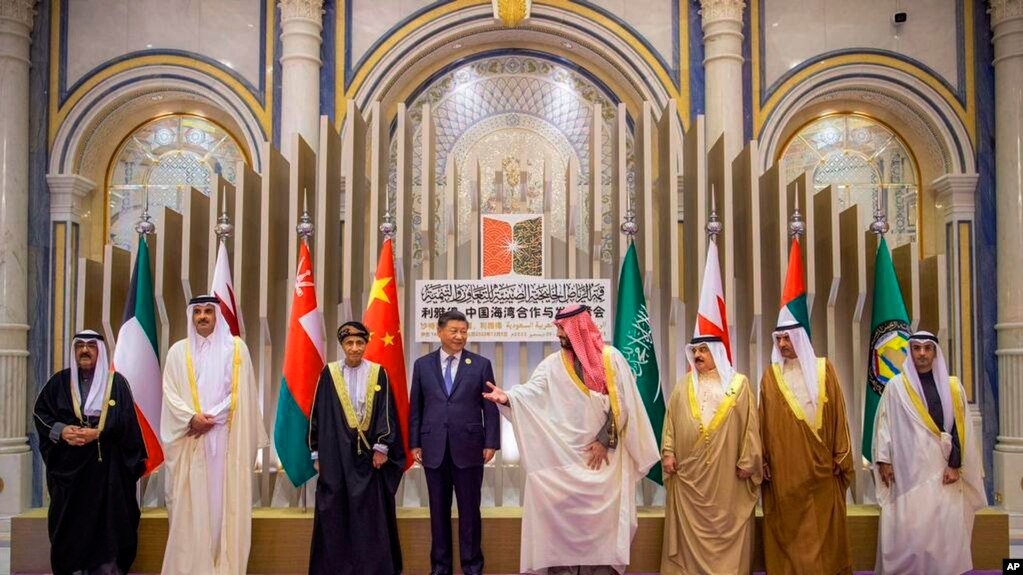
WASHINGTON —
Chinese President Xi Jinping, who is visiting Saudi Arabia, will attend two summits on Friday (December 9) and meet with dozens of Arab leaders from the Middle East, West Asia and Africa. This is a major effort by China to find allies outside the United States and Europe.
Xi said he hoped the two summits would become "a milestone" in the history of China-Arab relations and China's relationship with the Gulf Cooperation Council.
Xi Jinping arrived in Riyadh on Wednesday, starting his three-day visit to Saudi Arabia. It was his first state visit to the longtime U.S. ally in the Middle East after the three-year coronavirus pandemic. The Saudi side gave Xi Jinping an oversized welcome.
Xi held talks on Thursday with Crown Prince Mohammed bin Salman, the 37-year-old de facto leader of Saudi Arabia. This is the first summit of Xi Jinping's visit. Both sides emphasized the importance of maintaining stability in the international oil market.
The two sides issued a joint statement, promising to strengthen cooperation, uphold the principles of sovereignty and "non-interference in internal affairs", and emphasized the peaceful resolution of the conflict between Russia and Ukraine.
The statement said the two sides reaffirmed that they would continue to firmly support each other's "core interests." Riyadh also expressed support for Beijing's "one China" policy toward Taiwan.
When referring to the security concerns of the Gulf countries over the Iranian nuclear program, the statement stated that both sides agreed that it is necessary to strengthen joint cooperation to ensure that the "Iranian nuclear program" is used for peaceful purposes, and that Tehran should respect the "principle of good neighborliness."
The Iran issue is a thorny issue in the relationship between China and Saudi Arabia. Saudi Arabia has long had religious and interest conflicts with Iran, and Riyadh sees Tehran as a major security threat. However, China has a close relationship with Iran. How to handle Sino-Iranian relations and ensure that this relationship does not cause displeasure in Riyadh is a big challenge for Beijing.
Leaders of the six Gulf Cooperation Council countries and the Arab League countries arrived in Riyadh one after another on Thursday to attend the China-GCC summit and the China-Arab League summit.
Xi's visit to Saudi Arabia comes at a low ebb in Saudi-U.S. relations, with rifts between the two sides over human rights issues, energy policy, the Russia-Ukraine war and questions over U.S. security commitments to the Gulf region.
The United States remains highly vigilant against China's actions to expand its influence in the Middle East. As the world's largest energy consumer, China has made significant investments in this region, and Chinese companies are trying to enter the region's technology and other infrastructure fields.
The New York Times said that China surpassed the United States many years ago to become Saudi Arabia's main trading partner. Crown Prince Mohammed has accelerated efforts to diversify Saudi Arabia's allies, seeking to forge a more independent path away from reliance on the United States as its main security guarantor and arms supplier.
Statistics show that Saudi Arabia is China's largest trading partner in the Middle East and China's largest crude oil supplier, while China is Saudi Arabia's largest trading partner. In 2021, the trade volume between the two countries will reach US$87.31 billion, a year-on-year increase of 30.1%.
The summit was attended by the Emir of Qatar, the Crown Prince of Kuwait, the presidents of Egypt, Tunisia, Djibouti, Somalia, Mauritania, and the prime ministers of Iraq, Morocco, Algeria, Sudan, and Lebanon.
Before the summit, Xi Jinping also held bilateral talks with Kuwaiti Crown Prince Mishal, Egyptian President Sisi, Iraqi Prime Minister Sudani, Sudanese leader Burhan and Palestinian President Mahmoud Abbas.
The two sides announced the conclusion of 46 agreements and memorandums of understanding, covering a wide range of areas from housing to Chinese language teaching. The two sides are trying to achieve economic and strategic interests through deepening cooperation.
Saudi state media reported on Thursday that during Xi Jinping's visit, the two sides will sign more than 20 agreements with a total value of 30 billion U.S. dollars.
But Agence France-Presse reported on Friday that, so far, no details of those agreements have been seen.



0 Comments